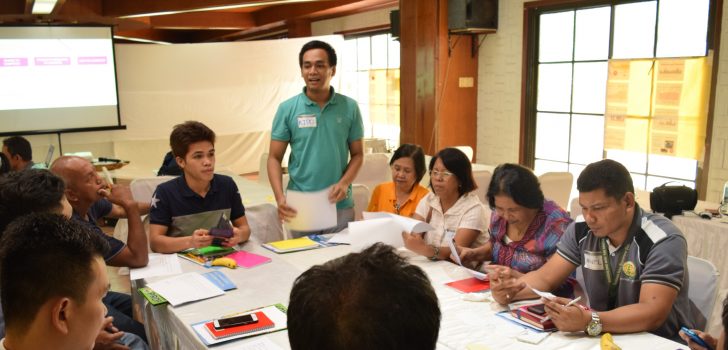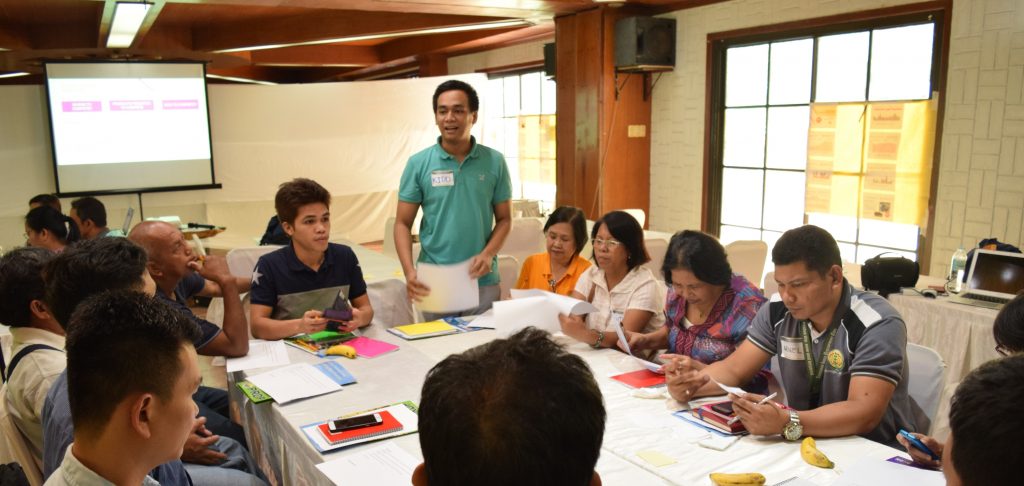 I-PLAN Officer Kevin George Calubayan of the PRDP National Project Coordination Office facilitatesd the discussion of constraints and opportunities of the coconut industry in the CALABARZON region.
I-PLAN Officer Kevin George Calubayan of the PRDP National Project Coordination Office facilitatesd the discussion of constraints and opportunities of the coconut industry in the CALABARZON region. I-PLAN convenes South Luzon leg for coconut’s national VCA
LUCENA CITY, QUEZON – The stakeholders of the coconut industry in the South Luzon cluster covened for the national consultation for coconut’s Value Chain Analysis (VCA) on July 29.
“Ginagawa natin ito para matukoy ang mga intervention na kailangan upang mapagbuti natin ang serbisyo para sa mga nasa industriya ng niyog. Nais din natin na ang lahat ng proyekto ng gobyerno ay may pinanggagalingang plano (We are doing this to identify needed interventions to provide better services to the coconut industry players. We also want that all government projects will be based on a structured plan),” Planning Officer Dennis Barrogo of PRDP-National Project Coordination Office said.
Participants of the consultation include coconut farmer groups, government agencies, processing companies, and other stakeholders that have an important role in the coconut’s value chain.
As presented in the consultation, the areas planted with coconut nationwide grew from 3.13 million hectares in 1997 to 3.61 million hectares in 2017 while production volume increased from 13.71 million metric tons in 1997 to 14.05 million metric tons in 2017.
Marian Boquiren, Value Chain Development Specialist and consultant for the creation of the national VCA for coconut, on the other hand, cautioned the participants. “While it is true that the production volume grew by two percent over twenty years, this was primarily driven by increase in area planted.”
She further discussed that the number of bearing trees decreased from 97 to 95 while weight of nuts per tree decreased from 45 kg/tree in 1997 to 41 kg/trees in 2017. These data are based on the consolidated reports of Philippine Statistics Authority over 20 years.
Boquiren also noted that the challenges being faced by the farm ers are cyclical in nature. Old trees, declining soil fertility, increase in pest and diseases, extreme weather, and limited access to financial and extension services are the causes and effects of low productivity, rising costs, volatile prices, and small income and few investments.
Despite the challenges, she encouraged the participants to take advantage of a promising opportunity–the foreign market for lucrative products like virgin coconut oil and coconut water. That is why government support is needed in getting organic certification as a requirement for international markets like the United States and Europe.
“Kahit na malaki ang naiaambag ng ating industriya sa ekonomiya ng bansa, nanananatiling mahirap ang buhay ng mga magsasaka. Wala kasi kaming bargaining power. Pero dahil sa activity natin, maaari na nating matukoy ang pinakaepektibong paraan upang maiangat ang buhay natin (Even if the coconut industry boosts our economy, farmers are still poor because we do not have bargaining power. I hope that through this activity, we can identify the most effective way to uplift the farmers’ lives),” Francisco Rubio said.
It was also recommended to establish local processing centers and laboratory for coconut hybridization as well as ramp up the promotion of multi-cropping system to help diversify sources of income of the farmers.
CALABARZON has a regionwide VCA for virgin coconut oil while the nationwide VCA will be for the whole range of coconut products like dessicated coconut, coconut oil, oleochemicals, coir, charcoil, and activated carbon.
Consultative meetings for cacao and seaweeds will also be done for their nationwide VCA. ### (Lawrence Albert Bariring, DA-PRDP CALABARZON RPCO InfoACE Unit)

